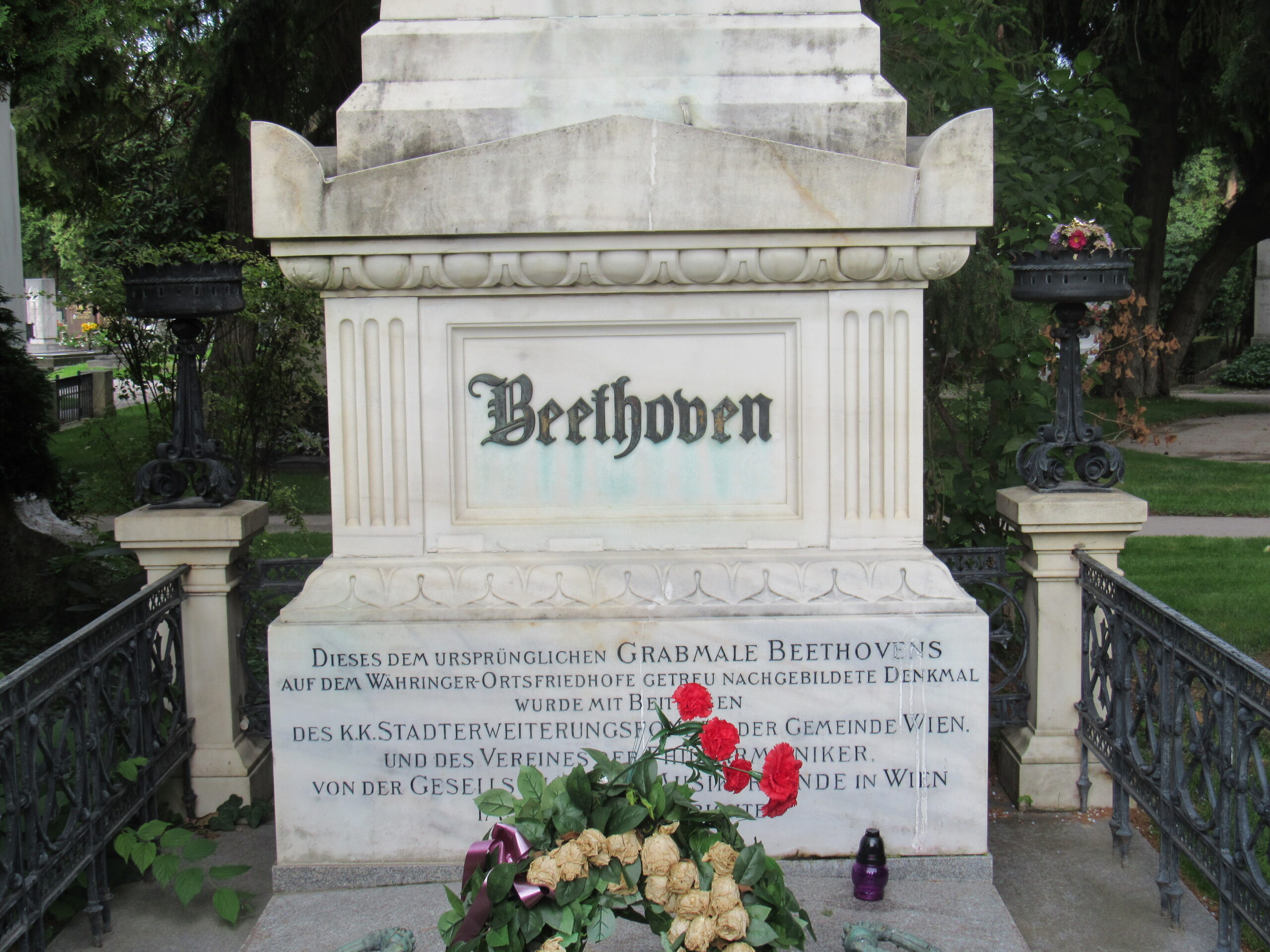|
Getting your Trinity Audio player ready...
|
Above: the grave of Ludwig van Beethoven at Vienna Central Cemetery. One of his final works was his Missa Solemnis.
Two hundred years ago, on April 6, 1824, for the first time in St. Petersburg, the Missa Solemnis in D major for four solo voices, chorus, and orchestra, Op. 123 by Ludwig van Beethoven (†1827) was performed, “one of the greatest examples of will to power achieved by art” (P. Isotta).
Beethoven had a piano and composition pupil who became his illustrious patron: Archduke Rudolf of Austria (†1831), last-born of Leopold II (brother of Emperor Francis I). The composer dedicated fifteen of his works to him, including this Missa Solemnis. Begun in 1819, it was originally designed for the episcopal consecration of the archduke (March 20, 1820), already a cardinal, appointed archbishop of Olmütz in Moravia. However, the work was finished much later. Beethoven, who was never able to hear the complete performance, worked on it at different times for four years, studying the sacred music of Palestrina (†1594), Händel (†1759), Bach (†1750), and Carl Philip Emanuel Bach (†1788), as many procedures in the score denote. He hoped that “from the heart it can again reach the heart,” as we read in the dedication.
On the occasion of the fiftieth anniversary of the priesthood of Pope Paul VI — ordained on May 29, 1920, in the cathedral of Brescia by Bishop Giacinto Gaggia — and the second centenary of Beethoven’s birth, Italian Radio and Television promoted the performance of theMissa solemnis in St. Peter’s Basilica in the Pope’s presence on the afternoon of May 23, 1970. It was an “enchanting moment,” as the guest of honor said before taking “farewell, moved and thoughtful, by the Artists and Listeners.”
The Pope also said at the end of the concert:
Thus We have enjoyed, under this dome, a meeting of giants of human genius, Michelangelo and Beethoven, both exalted by their work in the same momentum of the incomparable offer of their talent to humanity, open to the boundless horizons of the religious world. At the end of this sacred and artistic event, let the word be to Ludwig van Beethoven himself: ‘During the work on this Grand Mass my main purpose was to evoke in both the singers and the listeners religious sentiments and to instill them permanently.’ And also: this work, ‘coming from the heart, may it reach the heart.’[1]
For at least two reasons, that enchanting moment in 1970 remains a major event. For the first time, the Vatican Basilica hosted concert music, addressing all the fatal acoustic defects of the vast environment. Plus, the evening was broadcast to more than 300 million people through the 144 television stations connected with Italian Radio and Television and its eight cameras, regulated by Franco Zeffirelli (†2019).
Poor Beethoven could never have imagined such pomp for the performance of his Mass, for the publication of which he requested, with little success, financial aid from the various European courts. Yet from the letters addressed by the composer emerges a Beethoven who is anything but surly, rough, and contemptuous towards the conventions of society life. For instance, on February 5, 1823, he wrote to Louis I, Grand Duke of Hesse (†1830):
Royal Highness! The undersigned has just now completed a work that he considers to be the most successful of all his productions. It is a “solemn mass” for four solo singers, choirs, and a large full orchestra, which can also be performed as an oratorio. The undersigned therefore expresses the desire to send a copy to Your Royal Highness and respectfully prays Your Royal Highness to deign to grant permission.[2]
Also interesting is the note written on February 10, 1820, to the publisher Peter Joseph Simrock (†1868) in Bonn: “As for the Mass, which will soon be performed, the fee is 125 louis d’or. It’s pretty big work. But I must ask you to give me an answer on this matter within no more than a few weeks, otherwise I will lose out, since for all that time I will not be able to offer it to other publishers.”[3]
This score has become a sign of contradiction. On the one hand, there are those, like the French composer Vincent d’Indy (†1931), who consider it a supreme expression of the Catholic faith in which the Bonn musician manifests his devotion to the Church. On the other hand, there are those who believe it to be the work of an original Catholic, who, in the wake of the Enlightenment deism of the 17th and especially 18th centuries, leans towards pantheism. Perhaps the most acceptable opinion remains that of the French politician Eduard Herriot (†1957), according to whom we find a religious accent in the Missa solemnis, whatever the religion.[4]
The words of Pope Benedict XVI, pronounced in a video message in German regarding this gigantic work, performed on July 29, 2005, in the Cologne Cathedral, in view of the World Youth Day of that year, serve to conclude our brief remembrance:
Even for Beethoven, a man who struggles and suffers in a time of change, it was evidently an interior necessity […] to create a high mass […]. The Missa Solemnis is no longer liturgical music in the proper sense. […] Even the faith of the Church is no longer an obvious fact. The words of man’s prayer now become ways of fighting for God, of passion for God and for oneself […]. In this sense, the Missa Solemnis is an ever-new touching testimony of a faith that seeks, that does not let God escape, and that, through the prayer of the centuries, reaches Him again (our translation).
[1] Paul VI, Speech, May 23, 1970; our translation.
[2] In A Casella, Beethoven intimo, Florence 1981, p. 151; our translation.
[3] Epistolario, Milano 1999, vol. 2, p. 422; our translation.
[4] Cfr E. Herriot, Beethoven. La sua vita e il suo tempo, Milan 1947, p. 253 s.


